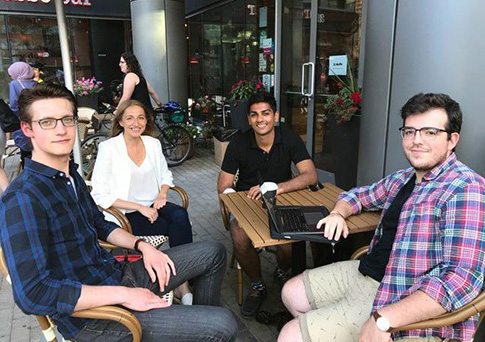
Second-year law student German Guberman (lower right), Will Boane (lower left), second-year law student Amanda Wolczanski (top left) and Govind Mohan (top right).
Established as a cross-disciplinary student group at University of Toronto’s Faculty of Law, U of T Legal Hackers is a chapter of a world wide organization aiming to bring the “hacker” mindset – using technology to build innovative solutions – to the legal profession.
“Legal Hackers brings people together, from the tech and law worlds, to discuss issues surrounding the regulation of technology, how to bring technology into the law, and do practical learning activities,” says second-year law student German Guberman, a co-founder of U of T Legal Hackers.
U of T Law will be the only host in Canada for another worldwide legal tech initiative, the Global Legal Hackathon, the world's law-themed hackathon, March 6 to 8. Last year more than 6,000 participants across 46 cities in 24 countries took part.
Law Professors Gillian Hadfield and Anthony Niblett are the faculty advisers for U of T Legal Hackers.
“U of T Law is uniquely positioned in Canada to host this event. Our faculty includes many world-class researchers exploring and teaching about the future of law, and our students have a real thirst for learning about innovation, and a desire to find technological solutions that will improve the law,” said Niblett, Canada Research Chair in Law, Economics and Innovation.
“I'm excited to see what our students create, reimagining what is possible in our justice system.”
Guberman is no stranger to rapid tech development. While in law school he co-founded a web data visualization company, DataX, and later joined the founding team of network infrastructure company, Virgil Systems, both incubated at the Rotman School of Management’s Creative Destruction Lab (CDL).
Hackathon participants can develop solutions that either have a private benefit for the business and practice of law, a public benefit, such as legal systems that improve access to justice, or an inclusivity benefit.
“We want a healthy [team] mix of tech people that aren't really [all that] familiar with law, and law people who are somewhat familiar with tech, but not in its implementation,” says Guberman.
The event includes a workshop on access to justice and venture-based legal innovation from Toronto practitioners and entrepreneurs. The event is sponsored by the Faculty of Law, the Ontario Bar Association (OBA), LexisNexis and DataX. The local organizing team relied on support from, Legaliciity, the OBA, and law firms, Frasken, Norton Rose Fulbright, and Osler, Hoskin and Harcourt.
A top project from each category will be selected from each host site. Winning teams will participate in a semi-final virtual round on March 22. Round-two finalists will be invited to demonstrate their technological solutions to a live panel of judges in London, UK on May 16.
Hadfield, a world leader in the emerging field of law and technology and director of the Schwartz Reisman Institute for Technology and Society, says the legal profession can no longer ignore the disruptive force of technology, not only from a regulatory standpoint but also within daily practice.
“If law students get ahead of the curve in understanding how law and technology intersect, they can play a role in inventing new modes of legal practice, new legal technologies and new businesses that can improve everything from the quality of legal help available to large businesses, to the crisis in access to justice in a complex world.”
With files from Global Legal Hackathon

